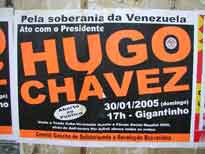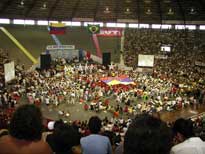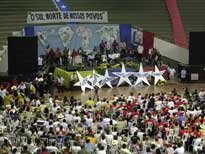
 Hugo Chavez
returns to the World Social Forum
Hugo Chavez
returns to the World Social Forum
Marc Becker
marc@yachana.org
February 5, 2005
Two years ago Hugo Chavez was a less than welcome visitor to the World Social Forum in Porto Alegre, Brazil. As the president of Venezuela, his participation was specifically excluded from this meeting of civil society. Instead, he had to meet with his supporters in a small auditorium away from the main events. Ironically, that same year the largest and arguably most significant event was a rally at the outdoor amphitheater Pôr-do-Sol that sent the newly elected Brazilian president Luis Inácio Lula da Silva off to Davos, Switzerland for the competing World Economic Forum. While not on the formal program, organizers engaged in intellectual gymnastics to open a space for the popular Lula who appeared to represent the best hopes and aspirations of the Latin American left.
How much difference two years can make. Both presidents again came to Porto Alegre, and their receptions were radically different–both from each other as well as from two years ago. On the second day of the six-day meeting, Lula headlined an event at the Gigantinho stadium that was packed with fifteen thousand people–one of the largest meetings of the forum but small compared to the estimated 100,000 people who had turned out to cheer him two years ago. The purported purpose of the meeting was to launch the Global Call to Action Against Poverty (see www.whiteband.org). The real purpose, however, seemed to be to attempt to shore up his support from civil society that has become skeptical of his increasingly neo-liberal policies. The spectacle, however, turned into a shouting match between supporters sporting red “100% Lula” t-shirts and a radical left opposition that wants to hold Lula to the Partido dos Trabalhadores (PT, Workers Party) platform that rejects IMF adjustment programs.
 On the second to last day event, Chavez packed to overflowing the same
Gigantinho stadium with his own show. For Chavez, this event was much larger
and more significant than his meeting two years ago in Porto Alegre. Like
Lula, while not formally on the WSF program organizers permitted the Venezuelan
president a much more visible presence in the forum. In part, this reflects
ongoing and evolving debates within the World Social Forum over the role
of engaging state structures in changing society. As Thomas Ponniah from
the Network Institute for Global Democratization noted, massive mobilizations
of civil society on February 15, 2003 did not stop the war but electing
a socialist government in Spain did lead to their immediate withdrawal.
Increasingly, more people are recognizing traditional politics as key to
realizing fundamental social changes.
On the second to last day event, Chavez packed to overflowing the same
Gigantinho stadium with his own show. For Chavez, this event was much larger
and more significant than his meeting two years ago in Porto Alegre. Like
Lula, while not formally on the WSF program organizers permitted the Venezuelan
president a much more visible presence in the forum. In part, this reflects
ongoing and evolving debates within the World Social Forum over the role
of engaging state structures in changing society. As Thomas Ponniah from
the Network Institute for Global Democratization noted, massive mobilizations
of civil society on February 15, 2003 did not stop the war but electing
a socialist government in Spain did lead to their immediate withdrawal.
Increasingly, more people are recognizing traditional politics as key to
realizing fundamental social changes.
Inside the Gigantinho stadium, the largely Brazilian audience capitalized on the Chavez event to continue their shouting matches over the Lula government with some seemingly desiring to present Lula as an “old style” government in decline with Chavez representing a new alternative in ascendency. Chavez began his talk with an immediate repudiation of this representation of him as a new type of leader, saying that he admired and drew inspiration from a broad range of “old” leaders starting with Jesus Christ, “one of the biggest anti-imperialist and revolutionary leaders in history.” He then proceeded through a pantheon of Latin American leftist heroes: Atahualpa, Simón Bolívar, Emiliano Zapata, Poncho Villa, Augusto César Sandino, Che Guevara, and Fidel Castro.
“I’m not here as president,” Chavez noted in a seeming acknowledgment of the forum’s roots as a movement of civil society. “I’m Hugo. The presidency is just a crappy job I’ve been assigned. I’m really just a peasant, a soldier, a man committed to the struggle for a better world.” As the crowd roared its approval, Chavez continued. “Every day I’m more revolutionary. It’s the only path we can take to break down hierarchy and imperialism.” He then proceeded to emphasize his leftist credentials with a political consciousness gained through the reading of Mao and Che Guevara. He argued for a need for a revolutionary consciousness, and the largest consciousness for a need for revolutionary changes has emerged from the south.
 As has become common, Chavez engaged in a strong anti-imperialist discourse.
He cast his message as “the South stopping the destruction of the
Bush doctrine.” “Latin America is stronger than it has ever
been in the last one hundred years,” Chavez declared. “All empires
will come to an end, including that of the United States.” He pointed
to significant victories, including the failure of the U.S. to implement
the Free Trade Area of the Americas (FTAA) on January 1, 2005 as planned. “Venezuela
is resisting North American imperialism,” Chavez stated. “United
States imperialism is not invincible.” The empire’s engaging
of brute force in Iraq and elsewhere is a sign of weakness and decline. “There
are no good and bad imperialisms,” he argued. “They are all
bad.”
As has become common, Chavez engaged in a strong anti-imperialist discourse.
He cast his message as “the South stopping the destruction of the
Bush doctrine.” “Latin America is stronger than it has ever
been in the last one hundred years,” Chavez declared. “All empires
will come to an end, including that of the United States.” He pointed
to significant victories, including the failure of the U.S. to implement
the Free Trade Area of the Americas (FTAA) on January 1, 2005 as planned. “Venezuela
is resisting North American imperialism,” Chavez stated. “United
States imperialism is not invincible.” The empire’s engaging
of brute force in Iraq and elsewhere is a sign of weakness and decline. “There
are no good and bad imperialisms,” he argued. “They are all
bad.”
Chavez consciously contrasted his reception this year, his political positions, and the situation in Venezuela with that of his last visit in 2003. At that point, his government faced a recall referendum. Imperialism was relentlessly attacking the country which was wrecking havoc on the economy. Venezuela was in the midst of an employer strike from the state-owned PdVSA petroleum country that had paralyzed the economy. He acknowledged the acts of solidarity that Venezuela received at that point, particularly from the people and government of Cuba. He stated his “faith in people to respond to threats” and observed that “the people of Venezuela will never surrender.”
Today he presented Venezuela as being in a much better situation, both in terms of consolidation of the revolutionary process as well as advancing a social agenda of redistributing wealth to the poor. In what some took as a jab at Lula’s policies, to the loud approving cheers of the audience he argued that education, health care, water, electricity, and other public services are the right of the people and should not be privatized. Reflecting a radicalization of his policies and language, he pointed to the failures of savage capitalism and argued that capitalism can only be transcended with socialism through democracy. (I don’t remember previously hearing Chavez publicly define the Bolivarian Revolution as a socialist project, so this struck me as a significant statement.)
Subtly, during his talk Chavez seemed to shift between different positions on the Lula government. He noted that “Fidel and I are alone” in challenged North American imperialism. “Out of respect,” he continued, “I cannot talk about internal affairs in Brazil.” Chavez noted that “Latin America is not the same as it was five years ago” when he was elected. Nevertheless, “in Venezuela, during my first years in office, many asked that I move quicker–but it was not time. This is not an easy process.” In a backhanded way, he seemed to be delivering a message to his largely Brazilian audience to support Lula and to give him time to realize his objective. “Every process has its own rhythm,” Chavez noted. It is interesting that two years into his term of office Lula is facing much of the same discontent that Chavez faced at that point in his term, but now the Venezuelan president has begun to solidify his support and is making significant advances in social reforms. He also talked of his dream of a unified Latin America, and as president of the region’s largest economy Lula would be a key ally in any such internationalist project.
 Chavez noted that the World Social Forum is the most important political
event in the world. Venezuelans, he noted, “are here to learn from
other experiments.” The WSF provides a solid platform for debate of
issues that will lead to advances in the Venezuelan process. Significantly,
next January the WSF is moving to a decentralized format with meetings on
four continents with the Americas hemispheric meeting taking place in Venezuela.
Some have questioned the wisdom of this move because that country does not
have a strong civil society, with most of the significant initiatives coming
from the government instead.
Chavez noted that the World Social Forum is the most important political
event in the world. Venezuelans, he noted, “are here to learn from
other experiments.” The WSF provides a solid platform for debate of
issues that will lead to advances in the Venezuelan process. Significantly,
next January the WSF is moving to a decentralized format with meetings on
four continents with the Americas hemispheric meeting taking place in Venezuela.
Some have questioned the wisdom of this move because that country does not
have a strong civil society, with most of the significant initiatives coming
from the government instead.
There is also a lingering skepticism among academics of state-centered development projects such as that in Venezuela, and fear that Chavez is a populist leader who ultimately will sell out the people for his own political and economic advances. What there is of civil society and popular movements in Venezuela, however, are hard-core Chavista. Never before have they had a government who cared for them or presented policies that benefitted them. While some of us may not find Chavez’ style and type of leadership ideal, he has been embraced by Venezuela’s subaltern masses as their champion. International activists perhaps should follow their lead in supporting the Bolivarian Revolution. The Venezuelan government has emerged at the forefront of challenging neoliberal economic policies, and presenting concrete alternatives to corporate-led globalization. Ironically, a state is implementing policies that for five years international civil society has desired but believed states were incapable of successfully realizing